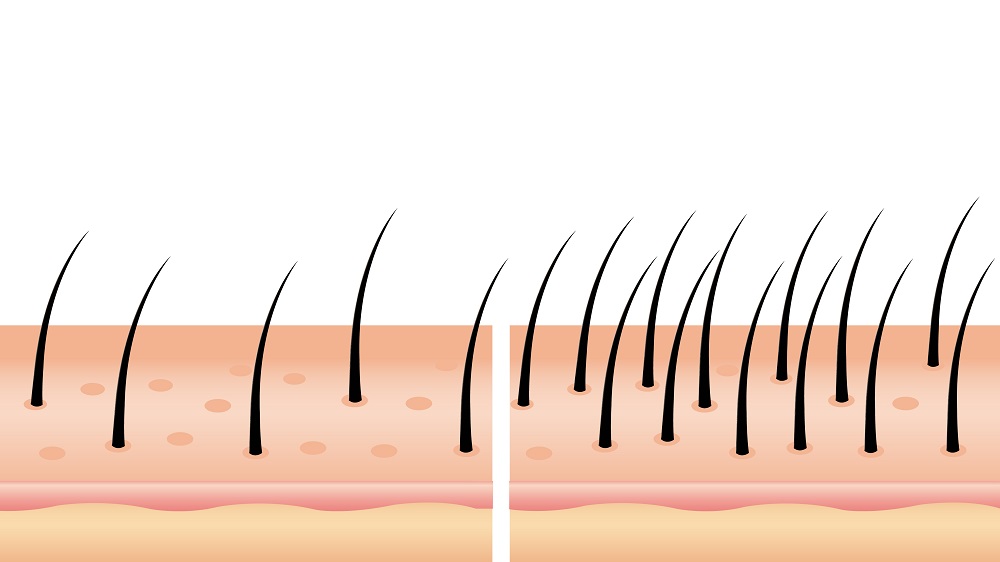Rapamycin Rescues Hair Growth in Mice
- This approach restored the hair cycle back to the growing stage.

A new study has found that autophagy plays an important role in activating hair follicle stem cells and keeping the hair growth cycle going. By boosting autophagy, rapamycin improved hair growth in mice and in a human hair organ culture [1].
Round and round it goes
The hair leads a cyclical life. First, a hair grows from the follicle in the anagen stage. It lasts for several years in humans, which and defines maximum hair length. Next comes a short period called catagen, when the follicle shrinks and stops getting nutrients from the skin. Finally, there’s telogen, when the old hair is replaced with a new one. The new one starts to grow, and the cycle repeats itself.
Hair follicle stem cells (HFSC) are a crucial element of this process. They are located in the bulge zone of hair follicles and are usually quiescent. Upon receiving certain molecular signals, they get activated and differentiate into various types of hair-related cells, ensuring that a new anagen phase will ensue. In hair growth disorders, such as androgenetic alopecia and stress-induced alopecia, HFSC dysfunction can cause extended telogen [2].
Autophagy, the process of recycling intracellular junk, is an important modulator of cellular metabolism. Autophagy levels decrease with age, including in stem cells, which is thought to contribute to their dysfunction [3]. In this new study published in Cell & Bioscience, the researchers wanted to investigate how autophagy levels in HFSCs affect hair regeneration.
Autophagy drives hair growth
In an initial mouse experiment, the researchers first confirmed that autophagy levels in HFSCs fluctuate across the hair growth cycle. During the shift from telogen to anagen, autophagy levels were elevated and then diminished once the anagen phase was reached. This pattern of autophagy variation in HFSCs aligned with the hair follicle cycle phases, indicating a potentially significant role of autophagy in a hair follicle’s progression from the telogen to the anagen stage.
The researchers then treated the mice with rapamycin, a drug that hardly needs introduction in the longevity community. Rapamycin, which upregulates autophagy by inhibiting the protein mTOR, is currently the most potent small molecule in terms of lifespan extension in mice [4]. Another group was treated with the autophagy inhibitor 3-MA. Inhibiting autophagy produced an effect opposite to that of rapamycin.
Modifying autophagy had an obvious impact on hair growth. Autophagy inhibition delayed the telogen-anagen transition in hair follicles, while boosting autophagy with rapamycin expedited it. “Surprisingly, on day 11, mice in the rapamycin group regained almost intact hair, whereas most hair follicles in the 3-MA group remained in the telogen”, the researchers report. The scientists also discovered that this was synchronized with HFSC activation. The cells’ proliferation rates were higher in the rapamycin group and much lower in the 3-MA group than in the control group.
Not just mice
Similar results were obtained in an organ culture with human hairs, showing that the findings were not specific to mouse hair. The researchers detected morphological differences between the groups: 3-MA hampered hair shaft growth, while rapamycin boosted it. As a result, one week into the experiment, the control group had 30% hair follicles in anagen, the 3-MA group had less than 20% follicles in anagen, and in the rapamycin group, more than half of the follicles remained in anagen: that is, they continued to generate hair growth.
In another in vitro experiment performed in HFSC cultures, the percentage of live cells was similar across the groups, but 3-MA inhibited cell proliferation, while rapamycin promoted it in a dose-dependent manner. This also corresponded to higher or lower amounts of autophagy. The researchers however note that since autophagy is a common phenomenon across cell types, it is possible that part of the effect observed is driven by cells other than HFSC, which should be a topic of further research.
Cellular autophagy maintains the metabolic homeostasis of cells and regulates stem cell activation by degrading soluble macromolecules and denatured organelles in the cytoplasm. Autophagy in mouse dorsal skin remains low during the telogen and increases upon entering the anagen. The Inhibition of autophagy causes hair follicles to enter the catagen earlier, highlighting the importance of autophagy in initiating the normal hair follicle cycle and hair regeneration under physiological conditions. In a mouse model of alopecia areata, researchers found that autophagy within hair follicles was suppressed, and the induction of autophagy alleviated alopecia symptoms, whereas its inhibition advanced disease development.
Literature
[1] Sun, P., Wang, Z., Li, S., Yin, J., Gan, Y., Liu, S., … & Miao, Y. (2024). Autophagy induces hair follicle stem cell activation and hair follicle regeneration by regulating glycolysis. Cell & Bioscience, 14(1), 1-18.
[2] Shin, W., Rosin, N. L., Sparks, H., Sinha, S., Rahmani, W., Sharma, N., … & Biernaskie, J. (2020). Dysfunction of hair follicle mesenchymal progenitors contributes to age-associated hair loss. Developmental cell, 53(2), 185-198.
[3] Revuelta, M., & Matheu, A. (2017). Autophagy in stem cell aging. Aging cell, 16(5), 912-915.
[4] Harrison, D. E., Strong, R., Sharp, Z. D., Nelson, J. F., Astle, C. M., Flurkey, K., … & Miller, R. A. (2009). Rapamycin fed late in life extends lifespan in genetically heterogeneous mice. nature, 460(7253), 392-395.








